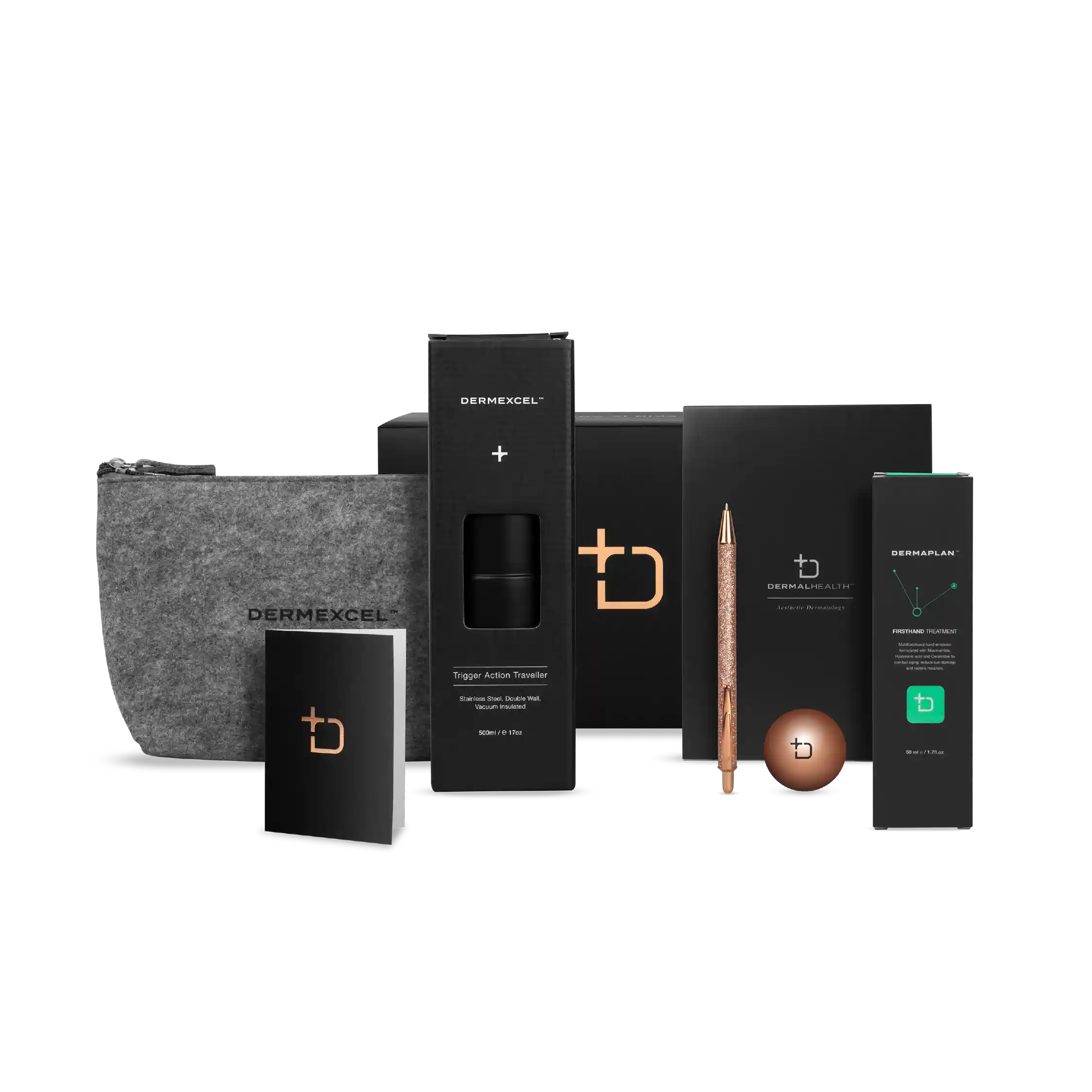
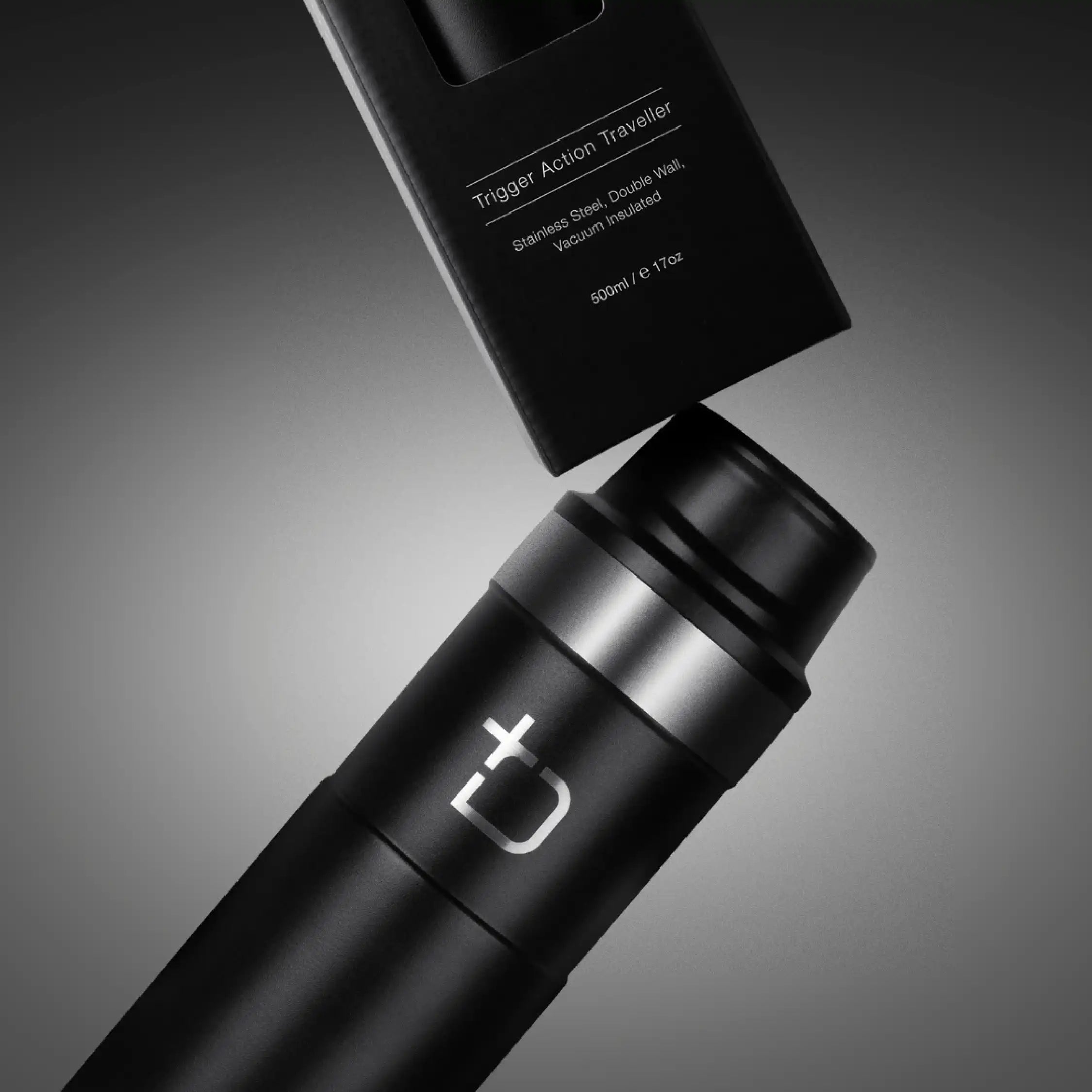
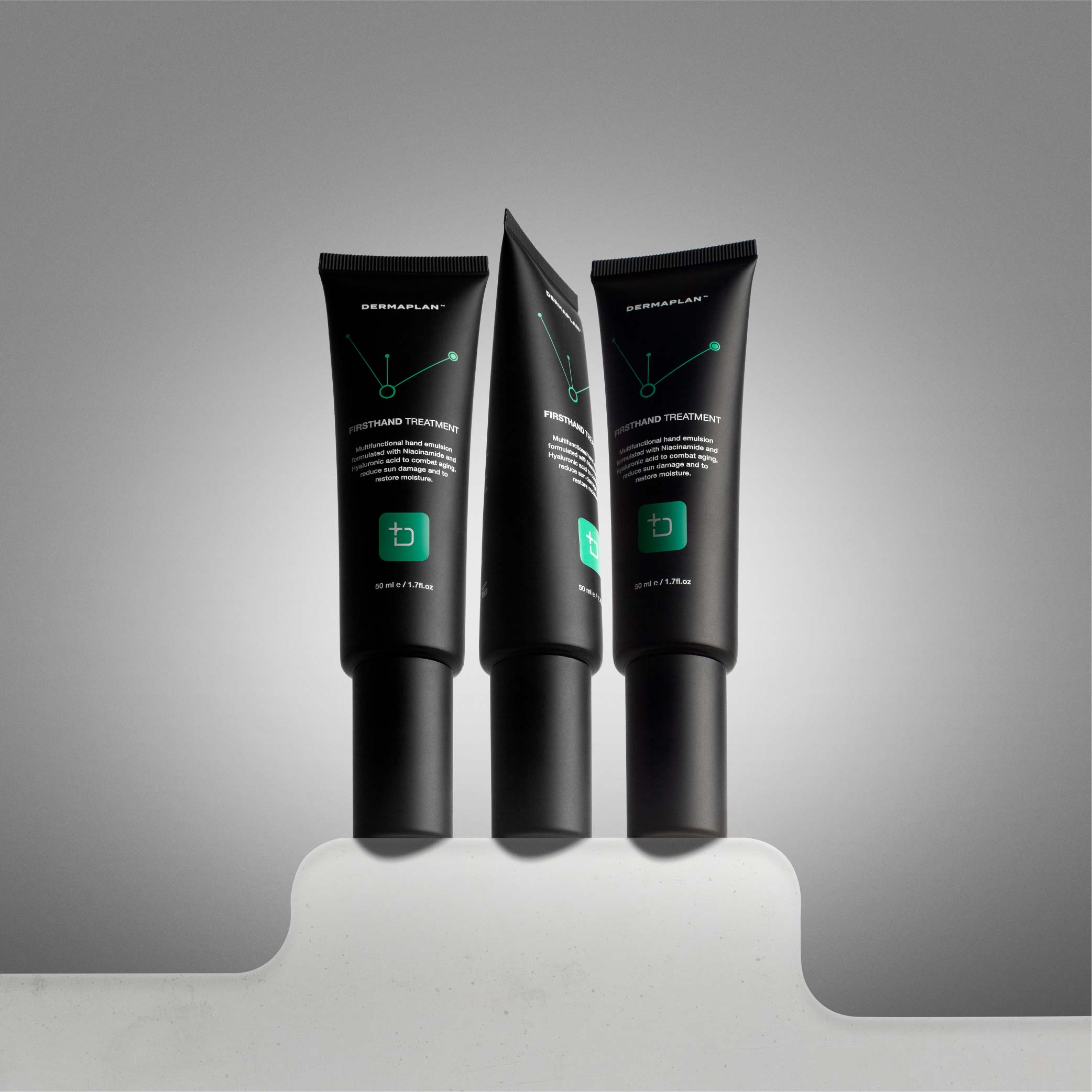




Effortless style. Everyday function. Genuine appreciation.

Moisturizing

Anti-Aging

smooth skin

barrier repair

↑ Elasticity




SHIPPING
- Shipping Guarantee: Guiding you to healthy skin isn’t only about our products; it's also about getting them to you as swiftly as the science behind them. That's why Dermal Health offers a shipping guarantee you can rely on.
- Where We Ship From: Orders are dispatched from our facilities in Pretoria.
- Who We Ship With: We trust only well-known, popular, and dependable courier services with your packages.
- When You'll Get It: Expect confident skin soon! Shipping addresses in Pretoria and Johannesburg will enjoy delivery from same-day to 2 business days. Shipping addresses further from Pretoria may expect delivery within 1-4 business days, depending on the service you select during checkout. Your estimated delivery date will reflect during checkout so that you can mark your calendar.
- Tracking Your Order: Eager to start your DermExcel journey? We don't blame you! You'll receive a tracking number after you place your order so that you can follow your package.
For any shipping inquiries, our customer service team is ready to assist.
SECURE PAYMENT
Dermal Health Science 30-Day Confidence Guarantee: We are passionate about guiding you to healthy skin through medical science. We believe in the quality and effectiveness of our products so much that we offer a 30-Day Confidence Guarantee.
If you're unsatisfied with your purchase, simply return it within 30 days for a full refund.
Healthy Skin Is Not Complicated and neither is our return policy. Please visit our detailed return policy or contact our friendly customer service team for more information.
Feel as confident in us as we want you to feel in your skin.

Choose options



Effortless style. Everyday function. Genuine appreciation.
Show your gratitude to the one who keeps everything running smoothly with the Secretary Gift Set—a curated collection of practical luxuries made to elevate the everyday. Perfect for the organized, detail-driven professional, this set brings together functional essentials with a touch of elegance to brighten their routine.
Whether it’s for Secretary’s Day, a birthday, or just a heartfelt thank you, this gift is a thoughtful way to recognize their dedication, precision, and care.
What’s Inside:
DermExcel Trigger Action Traveller
Stay refreshed and energized throughout the day with this sleek 500ml stainless steel bottle. Engineered with double-wall vacuum insulation and a leakproof, push-button lid, it keeps beverages hot, cold, or iced for hours. Durable, stylish, and made for one-handed ease—perfect for work or on the go.
Notebook and Rose Gold Glitter Pen
Add a touch of polish to everyday notes. The luxurious notepad and smooth-flowing rose gold pen make a stylish duo for jotting down reminders, meeting notes, or brilliant ideas.
Firsthand Treatment
Typing, organizing, and constant multitasking take a toll—this nourishing hand cream helps restore and protect with ceramides, niacinamide, and hyaluronic acid. Leaves hands feeling soft, smooth, and replenished.
Rose Gold Lip Butter Ball
A practical little luxury. This elegant balm keeps lips hydrated throughout the day and adds a subtle glow to any desk or handbag.
Felt Accessory Bag
Stylish, spacious, and soft to the touch, this neutral-toned felt bag keeps all their essentials in one place. Perfect for work, travel, or on-the-go organization, it ties the entire gift set together with a clean, modern finish.
Each piece in this set is handpicked to blend usefulness with a little indulgence—something they’ll truly appreciate. It’s the perfect balance of polish and practicality, wrapped in genuine gratitude.
active ingredients in this gift pack
Emollients
Emollients are crucial in dermatological care, primarily because they enhance skin hydration and barrier function. Here's a brief overview of their physiological effects and roles in managing various skin conditions.
Physiological Effects
- Hydration of Stratum Corneum: Emollients increase moisture content in the stratum corneum, the outermost layer of the skin, by reducing transepidermal water loss (TEWL). This is achieved through occlusion, which traps water in the skin.
- Restoration of Skin Barrier Function: They aid in replenishing the skin's lipid barrier, which is essential for maintaining skin integrity and protective function.
- Soothing and Smoothing Effects: Emollients smooth, flaky skin cells, making the skin surface appear smoother. They also provide a soothing effect, which can reduce itching and discomfort.
- Anti-inflammatory Properties: Some emollients have ingredients that offer mild anti-inflammatory benefits, helping to reduce redness and irritation.
Managing Dermatological Conditions
- Atopic Dermatitis (Eczema): Emollients are a cornerstone in the management of eczema, helping to maintain skin hydration, reduce flare-ups, and minimize the need for topical corticosteroids.
- Psoriasis: Regular use of emollients can reduce scaling and dryness associated with psoriasis, improving the efficacy of other topical treatments.
- Ichthyosis and Xerosis: These conditions, characterized by dry, scaly skin, benefit significantly from emollients, which help hydrate and soften the skin.
- Aging Skin: Emollients improve the appearance of aging skin by hydrating and reducing the visibility of fine lines and wrinkles.
- Skin Protection: Emollients can protect the skin from irritation and breakdown in individuals with incontinence or those who are bedridden.
References
- Proksch, E., & Lachapelle, J. M. (2005). The Management of Dry Skin with Topical Emollients. American Journal of Clinical Dermatology.
- Lynde, C. W. (2001). Moisturizers: What They Are and a Practical Approach to Product Selection. Skin Therapy Letter.
- Lodén, M. (2003). Role of Topical Emollients and Moisturizers in the Treatment of Dry Skin Barrier Disorders. American Journal of Clinical Dermatology.
d-Panthenol
d-Panthenol's multifaceted effects on skin hydration, barrier strengthening, and wound healing make it a valuable component in the management of various dermatological conditions, from dry skin to post-procedure care.
d-Panthenol, also known as pro-vitamin B5, is a popular dermatological ingredient due to its beneficial effects on the skin. Here's a brief overview of its physiological effects and roles in managing various skin conditions:
Physiological Effects
- Hydration: d-Panthenol is a humectant, meaning it helps to attract and retain moisture in the skin. This leads to increased skin hydration, which can improve skin softness and elasticity.
- Wound Healing and Repair: It plays a role in the synthesis of lipids and proteins, essential for skin repair. d-Panthenol has been shown to accelerate re-epithelialization in wound healing.
- Anti-Inflammatory Effect: d-Panthenol can reduce inflammation, making it beneficial in treating skin irritations and erythema.
- Skin Barrier Strengthening: By enhancing the synthesis of lipids and proteins, d-Panthenol contributes to the strengthening of the skin's barrier function, protecting against irritants and environmental damage.
- Soothing and Softening: It soothes the skin and makes it feel softer and smoother, which can be particularly beneficial for dry or rough skin textures.
Managing Dermatological Conditions
- Minor Wounds and Skin Irritations: Due to its role in skin repair and anti-inflammatory properties, d-Panthenol is used in the treatment of minor wounds, cuts, and skin irritations.
- Dermatitis and Eczema: It helps in managing conditions like dermatitis and eczema by reducing inflammation and enhancing skin barrier function.
- Dry Skin Conditions (Xerosis): Its moisturizing properties make it effective in treating dry skin, providing relief from itching and scaling.
- Post-procedure Care: d-Panthenol is often used in post-procedure care, such as after laser treatments or chemical peels, to aid in skin recovery and reduce inflammation.
References
- Proksch, E., & Nissen, H. P. (2002). Dexpanthenol enhances skin barrier repair and reduces inflammation after sodium lauryl sulphate-induced irritation. Journal of Dermatological Treatment.
- Ebner, F., Heller, A., Rippke, F., & Tausch, I. (2002). Topical use of dexpanthenol in skin disorders. American Journal of Clinical Dermatology.
- Camargo, F. B. Jr, Gaspar, L. R., & Maia Campos, P. M. B. G. (2011). Skin moisturizing effects of panthenol-based formulations. Journal of Cosmetic Science.
Medilan™'s unique formulation and hypoallergenic properties make it a valuable component in the management of various dermatological conditions, particularly for hydrating and soothing sensitive and dry skin.
Medilan™, a ultra-refined, hypoallergenic medical grade lanolin, has proven to be very beneficial for managing dermatological conditions. Below is a brief overview of its physiological effects and roles in managing various skin conditions:
Physiological Effects of Medilan™
- Emollient: Medilan™ is an excellent emollient, helping to soften and smooth the skin by retaining moisture. It creates an occlusive barrier, which reduces transepidermal water loss (TEWL).
- Moisturizing: It is highly effective in moisturizing dry and rough skin, enhancing skin hydration by trapping and sealing in moisture.
- Hypoallergenic: Medilan™ is ultra-purified to minimize the risk of allergic reactions, making it suitable for sensitive skin types.
- Wound Healing: Medilan™ aids in the healing process of minor cuts, abrasions, and burns by maintaining a moist wound environment.
- Skin Barrier Function: It enhances the skin's barrier function, protecting against environmental irritants and reducing the risk of skin infections.
- Lipid Replenishment: Medilan™ mimics the lipids found in human skin, helping to restore the lipid barrier of the skin, especially beneficial in dry and chapped skin conditions.
- Skin Penetration and Hydration: It has the ability to penetrate the skin and aid in water retention in the stratum corneum, the outermost layer of the skin, thus enhancing hydration.
- Occlusive Properties: Medilan™ helps in reducing transepidermal water loss by forming a barrier on the skin surface, thereby retaining moisture and improving skin barrier function.
Role in Managing Dermatological Conditions:
- Eczema and Dry Skin Conditions: Due to its soothing, hydrating, and occlusive properties, Medilan™ is a valuable ingredient in treating eczema and other dry skin conditions.
- Wound Healing: While primarily used for its emollient effects, the properties of Medilan™ also aid in the healing of minor wounds and skin irritations.
- Sensitive Skin Care: Its hypoallergenic nature makes it suitable for use in individuals with sensitive skin, reducing the risk of irritation or allergic reactions.
- Nipple Care in Breastfeeding: Soothes and heals cracked and sore nipples in breastfeeding mothers.
- Chapped Lips and Skin: It is effective in treating chapped lips and skin, providing a barrier that seals in moisture and protects from harsh weather conditions.
References
- Lodén, M., & Maibach, H. I. (2000). Dry skin and moisturizers: chemistry and function. CRC Press.
- Suleman, H., et al. (2000). Role of lanolin in managing eczema and dry skin conditions. Community Nurse.
- DiNardo, J. C. (2000). Is lanolin allergy a myth? Dermatitis.
- Stone, L. (2000). Medilan: a hypoallergenic lanolin for emollient therapy. British Journal of Nursing.
- ResearchGate Article on Medilan™ highlighting its role in skin care and emollient therapy.
Ceramides
Ceramides, a family of lipid molecules naturally present in the skin, are integral to the structure and function of the skin barrier. They are a type of lipid that, along with cholesterol and fatty acids, forms a critical part of the stratum corneum, the outermost layer of the skin. This layer is essential for maintaining skin hydration and protecting against environmental aggressors.
Ceramides, which make up about 50% of the skin's lipid composition, play a pivotal role in maintaining the skin's barrier integrity and preventing transepidermal water loss (TEWL). By doing so, they help keep the skin hydrated and supple.
The loss or reduction of ceramides in the skin barrier is associated with several dermatological conditions, including eczema and psoriasis, where the skin becomes dry, itchy, and prone to irritation and infection. Studies have shown that the application of ceramide-containing moisturizers can effectively improve skin barrier function and increase skin hydration levels.
Ceramides are particularly beneficial for aging skin, which naturally loses ceramides over time, leading to drier and more fragile skin. By replenishing the skin's ceramide content, these products can help combat the signs of aging, such as fine lines and wrinkles.
Ceramides are integral to maintaining skin health, particularly in conditions where the skin barrier is compromised. Their role in hydrating the skin, reducing sensitivity, and improving barrier function makes them an essential component in the management of various dermatological conditions, especially eczema, psoriasis, and dry or aging skin.
Physiological Effects
- Barrier Function: Ceramides are critical components of the skin's lipid barrier. They help to prevent moisture loss and protect against environmental aggressors like pollutants and irritants.
- Hydration: By maintaining the barrier integrity, ceramides keep the skin hydrated, preventing dryness and keeping the skin supple.
- Reducing Skin Sensitivity: They play a role in reducing skin sensitivity and irritation, helping to calm inflamed and reactive skin.
- Anti-aging Properties: Ceramides can improve skin elasticity and firmness, helping to reduce the appearance of fine lines and wrinkles.
- Wound Healing: There is evidence to suggest that ceramides can aid in the skin's natural wound healing process.
Managing Dermatological Conditions
- Eczema and Atopic Dermatitis: Ceramides are often used in the treatment of eczema and atopic dermatitis, where the skin barrier is compromised, leading to dryness, itching, and inflammation.
- Psoriasis: They can help in managing psoriasis by maintaining skin hydration and barrier function, reducing scaling and dryness.
- Aging Skin: Ceramide-containing products are beneficial in anti-aging regimens due to their ability to improve skin barrier function and elasticity.
- Dry Skin (Xerosis): In the treatment of dry skin, ceramides help in restoring skin hydration and barrier function.
- Sensitive Skin: Products containing ceramides are suitable for sensitive skin as they help to restore the skin's natural barrier and reduce irritation.
References
- Del Rosso, J. Q., & Levin, J. (2011). The clinical relevance of maintaining the functional integrity of the stratum corneum in both healthy and disease-affected skin. Journal of Clinical and Aesthetic Dermatology.
- Farwanah, H., Wohlrab, J., Neubert, R. H. H., & Raith, K. (2005). Ceramides and skin function. American Journal of Clinical Dermatology.
- Di Nardo, A., Wertz, P., Giannetti, A., & Seidenari, S. (1998). Ceramide and cholesterol composition of the skin of patients with atopic dermatitis. Acta Dermato-Venereologica.
Glycerin, also known as glycerol, is a simple polyol compound widely used in dermatology due to its excellent moisturizing properties.
Glycerin's excellent hydrating properties, combined with its ability to soothe and improve skin barrier function, make it a highly valued ingredient in the treatment and management of various dermatological conditions, particularly those involving dryness and compromised skin barrier.
Physiological effects of Glycerin
- Hydration: Glycerin is a humectant, meaning it attracts water to the skin. It draws moisture from the environment and the deeper layers of the skin to the outer layer (stratum corneum), improving hydration.
- Skin Barrier Function: By enhancing skin hydration, glycerin helps to maintain and improve the skin's barrier function, protecting against irritants and reducing transepidermal water loss (TEWL).
- Soothing Effect: It has a soothing effect on the skin, which can be beneficial in reducing irritation and discomfort in various skin conditions.
- Elasticity and Resilience: Glycerin can improve skin elasticity and resilience, making the skin appear healthier and more supple.
- Wound Healing: Some studies suggest glycerin may play a role in accelerating wound healing processes and improving skin repair.
Role in Managing Dermatological Conditions
- Dry Skin Conditions (Xerosis): Glycerin is a key ingredient in many moisturizers and is highly effective in managing dry skin by providing deep hydration.
- Eczema and Dermatitis: Its moisturizing and soothing properties help in relieving the symptoms of eczema and dermatitis, such as dryness, itching, and irritation.
- Psoriasis: Glycerin can aid in reducing the dryness and scaling associated with psoriasis.
- Aging Skin: It is beneficial in anti-aging products due to its ability to hydrate the skin and improve its elasticity.
- Wound Care: Glycerin-based products may be used in the care of minor wounds and burns due to its potential role in enhancing wound healing.
References
- Fluhr, J. W., Darlenski, R., & Surber, C. (2008). Glycerol and the skin: holistic approach to its origin and functions. British Journal of Dermatology.
- Harding, C. R. (2004). The stratum corneum: structure and function in health and disease. Dermatologic Therapy.
- Lodén, M. (2005). Role of topical emollients and moisturizers in the treatment of dry skin barrier disorders. American Journal of Clinical Dermatology.
Stearic acid
Stearic acid, a saturated fatty acid, offers a multitude of benefits particularly for patients dealing with eczema and other dry skin-related dermatological conditions.
Biochemical Benefits
Stearic acid is a natural component of the skin's protective barrier, the stratum corneum. It plays a pivotal role in maintaining the barrier's integrity.
Eczema is characterized by a compromised skin barrier, leading to increased transepidermal water loss (TEWL) and susceptibility to external irritants.
By topically applying stearic acid, we are essentially providing the skin with a crucial building block it needs for repair and protection.
This biochemical harmony aids in reinforcing the skin's natural defenses.
References
- Rawlings, A. V. (2007). Trends in stratum corneum research and the management of dry skin conditions. International Journal of Cosmetic Science, 29(1), 7-10.
- Nakatsuji, T., Gallo, R. L. (2012). Dermatological therapy by topical application of nonpathogenic bacteria. Journal of Investigative Dermatology Symposium Proceedings, 15(1), 24-32.
- Loden, M., & Maibach, H. I. (2005). Voluntary human dosimetry of acutely applied topically delivered glycerol: a comparison between in vitro and in vivo assessments. Skin Research and Technology, 11(2), 87-91.
Hyaluronic acid (HA), is a naturally occurring glycosaminoglycan found throughout the body's connective, epithelial, and neural tissues. Most abundantly present in the skin, eyes, and synovial fluid, HA is renowned for its exceptional capacity to retain moisture — a single gram can hold up to six liters of water.
In skincare, the primary appeal of hyaluronic acid lies in its unparalleled hydrating abilities. As a humectant, HA attracts and retains moisture from the environment, thereby providing intense hydration to the skin. This hydrating property contributes significantly to maintaining skin plumpness, suppleness, and elasticity.
Beyond hydration, hyaluronic acid also plays a vital role in skin repair and regeneration. It supports the skin's healing and repair processes, and its anti-inflammatory properties make it beneficial in calming irritated skin. Moreover, HA's ability to promote the production of collagen, a crucial protein for skin elasticity, further underscores its anti-aging benefits.
The molecular size of hyaluronic acid influences its skin penetration and efficacy. High molecular weight HA remains on the skin's surface, providing hydration and forming a barrier against moisture loss. In contrast, low molecular weight HA penetrates deeper into the skin's layers, offering more profound hydrating and rejuvenating effects.
Hyaluronic acid's remarkable ability to hydrate, improve skin elasticity, aid in wound healing, and provide antioxidant protection makes it a valuable component in managing a variety of dermatological conditions, particularly those related to aging, dryness, and sensitive skin.
Physiological Effects of Hyaluronic acid
- Hydration: Hyaluronic acid is a powerful humectant that can hold up to 1000 times its weight in water, significantly enhancing skin hydration and leading to plumper, more hydrated skin.
- Skin Elasticity and Wrinkle Reduction: By increasing skin moisture, it improves skin elasticity, reduces the appearance of fine lines and wrinkles, and gives the skin a more youthful appearance.
- Wound Healing: It plays a role in wound healing due to its ability to regulate inflammation levels and signal the body to build more blood vessels in the damaged area.
- Barrier Enhancement: Hyaluronic acid helps reinforce the skin's natural barriers, protecting against environmental factors and retaining moisture.
- Antioxidant Properties: It provides antioxidant defense against free-radical damage from the sun and pollution.
Role in Managing Dermatological Conditions
- Aging Skin: Its ability to reduce wrinkles and improve skin elasticity makes it popular in anti-aging skincare products.
- Dry Skin: Hyaluronic acid is beneficial in treating dry skin conditions by providing intense hydration.
- Wound Care: Its role in wound healing is leveraged in post-procedure care, such as after laser treatments, and in healing minor cuts and abrasions.
- Acne Scars: It can help in the treatment of acne scars by promoting skin regeneration and reducing inflammation.
- Sensitive Skin: Due to its gentle nature, hyaluronic acid is suitable for sensitive skin, providing hydration without causing irritation.
References
- Papakonstantinou, E., Roth, M., & Karakiulakis, G. (2012). Hyaluronic acid: A key molecule in skin aging. Dermato-endocrinology.
- Jegasothy, S. M., Zabolotniaia, V., & Bielfeldt, S. (2014). Efficacy of a new topical nano-hyaluronic acid in humans. The Journal of Clinical and Aesthetic Dermatology.
- Wollina, U., & Abdel-Naser, M. B. (2019). Hyaluronic acid in the treatment and prevention of skin diseases: Molecular biological, pharmaceutical and clinical aspects. Skin Pharmacology and Physiology.
Niacinamide offers several benefits for the skin, primarily due to its anti-inflammatory and antioxidant properties. It has been shown to be effective in reducing the redness and inflammation associated with acne, rosacea, and other inflammatory skin conditions. Additionally, niacinamide's ability to improve the skin's barrier function makes it beneficial for all skin types, particularly for those with eczema or mature skin.
Another significant benefit of niacinamide is its role in reducing hyperpigmentation. Studies have shown that it can decrease the transfer of melanin to the skin's epidermis, helping to fade dark spots and even out skin tone.
Niacinamide also plays a role in reducing the visible signs of aging. It has been found to stimulate collagen production and improve skin elasticity, reducing fine lines and wrinkles. Its antioxidant properties further protect the skin from environmental damage, such as pollution and UV radiation, which contribute to premature aging.
The efficacy of niacinamide and its ability to address multiple skin concerns simultaneously has led to its growing popularity in both over-the-counter and prescription skincare formulations.
Physiological Effects of Niacinamide
- Barrier Function Enhancement: Niacinamide helps strengthen the skin’s barrier function by increasing the production of ceramides, which are lipids that keep the skin hydrated and protect against environmental damage.
- Anti-inflammatory Properties: It has notable anti-inflammatory effects, which are beneficial in reducing redness and inflammation associated with acne, eczema, and other inflammatory skin conditions.
- Sebum Regulation: Niacinamide can regulate sebum production, which helps in controlling excess oiliness and can be beneficial for acne-prone skin.
- Hyperpigmentation Reduction: It is known to reduce hyperpigmentation by inhibiting melanosome transfer from melanocytes to keratinocytes, leading to an even skin tone.
- Anti-aging Effects: Niacinamide helps in reducing the appearance of fine lines and wrinkles by boosting collagen production and improving skin elasticity.
- Antioxidant Activity: It has antioxidant properties, protecting the skin from oxidative stress and environmental aggressors like UV radiation and pollution.
Role in Managing Dermatological Conditions
- Acne and Oily Skin: By regulating sebum and reducing inflammation, niacinamide is effective in managing acne and oily skin conditions.
- Hyperpigmentation and Melasma: Its ability to reduce melanin transfer makes it beneficial in treating hyperpigmentation and melasma.
- Aging Skin: Its anti-aging properties make niacinamide a popular ingredient in skincare products targeting wrinkles and loss of firmness.
- Skin Barrier Disorders: Niacinamide is beneficial in the treatment of skin barrier disorders like atopic dermatitis and eczema, by enhancing barrier function and hydration.
- Photodamage and Skin Protection: It helps in mitigating the effects of photodamage and provides some degree of protection against environmental damage.
References
- Gehring, W. (2004). Nicotinic acid/niacinamide and the skin. Journal of Cosmetic Dermatology.
- Bissett, D. L., Oblong, J. E., & Berge, C. A. (2005). Niacinamide: A B vitamin that improves aging facial skin appearance. Dermatologic Surgery.
- Snaidr, V. A., Damian, D. L., & Halliday, G. M. (2019). Nicotinamide for photoprotection and skin cancer chemoprevention: A review of efficacy and safety. Experimental Dermatology.
- Navarrete-Solís, J. et al. (2011). A Double-Blind, Randomized Clinical Trial of Niacinamide 4% versus Hydroquinone 4% in the Treatment of Melasma. Dermatology Research and Practice, 2011.
Glycerin
Glycerin, also known as glycerol, is a simple polyol compound widely used in dermatology due to its excellent moisturizing properties.
Glycerin's excellent hydrating properties, combined with its ability to soothe and improve skin barrier function, make it a highly valued ingredient in treating and managing various dermatological conditions, particularly those involving dryness and compromised skin barrier.
Physiological Effects
- Hydration: Glycerin is a humectant that attracts water to the skin. It draws moisture from the environment and the deeper layers of the skin to the outer layer (stratum corneum), improving hydration.
- Skin Barrier Function: By enhancing skin hydration, glycerin helps to maintain and improve the skin's barrier function, protecting against irritants and reducing transepidermal water loss (TEWL).
- Soothing Effect: Its soothing effect on the skin can reduce irritation and discomfort in various skin conditions.
- Elasticity and Resilience: Glycerin can improve skin elasticity and resilience, making the skin appear healthier and more supple.
- Wound Healing: Some studies suggest that glycerin may accelerate wound healing processes and improve skin repair.
Managing Dermatological Conditions
- Dry Skin Conditions (Xerosis): Glycerin is a key ingredient in many moisturizers and is highly effective in managing dry skin by providing deep hydration.
- Eczema and Dermatitis: Its moisturizing and soothing properties help relieve the symptoms of eczema and dermatitis, such as dryness, itching, and irritation.
- Psoriasis: Glycerin can aid in reducing the dryness and scaling associated with psoriasis.
- Aging Skin: It is beneficial in anti-aging products because it hydrates the skin and improves its elasticity.
- Wound Care: Glycerin-based products may be used to treat minor wounds and burns due to their potential role in enhancing wound healing.
References
- Fluhr, J. W., Darlenski, R., & Surber, C. (2008). Glycerol and the skin: holistic approach to its origin and functions. British Journal of Dermatology.
- Harding, C. R. (2004). The stratum corneum: structure and function in health and disease. Dermatologic Therapy.
- Lodén, M. (2005). Role of topical emollients and moisturizers in the treatment of dry skin barrier disorders. American Journal of Clinical Dermatology.
Humectants
Humectants are a vital component in skincare, particularly for conditions characterized by impaired skin barrier function and excessive dryness. Their ability to attract and retain moisture in the skin makes them invaluable in both therapeutic and preventive dermatology.
Physiological Effects
- Moisture Attraction: Humectants draw moisture from the environment and the deeper layers of the skin to the outer layer (stratum corneum), enhancing skin hydration.
- Enhancing Skin Barrier Function: By improving skin hydration, humectants help to maintain and improve the skin's barrier function, protecting against irritants and reducing transepidermal water loss (TEWL).
- Skin Elasticity and Appearance: Improved hydration can enhance skin elasticity and reduce the appearance of fine lines and wrinkles, giving the skin a plumper and smoother look.
- Soothing Effect: Humectants can have a soothing effect on the skin, particularly in conditions involving dryness or irritation.
Managing Dermatological Conditions
- Dry Skin (Xerosis): Humectants are key ingredients in many moisturizers and are highly effective in managing dry skin by providing and maintaining hydration.
- Eczema and Dermatitis: Their moisturizing and soothing properties help in relieving symptoms of eczema and dermatitis, such as dryness, itching, and irritation.
- Aging Skin: Humectants are used in anti-aging skincare products due to their ability to hydrate the skin and improve its appearance.
- Psoriasis: They can aid in reducing the dryness and scaling associated with psoriasis.
- Acne-Prone Skin: Certain humectants can be beneficial in acne treatments, as they provide necessary hydration without clogging pores.
References
- Lodén, M. (2005). Role of Topical Emollients and Moisturizers in the Treatment of Dry Skin Barrier Disorders. American Journal of Clinical Dermatology.
- Rawlings, A. V., & Canestrari, D. A. (2011). Moisturizer technology versus clinical performance. Dermatologic Therapy.
- Fluhr, J. W., Darlenski, R., & Surber, C. (2008). Glycerol and the skin: holistic approach to its origin and functions. British Journal of Dermatology.
products in your gift pack
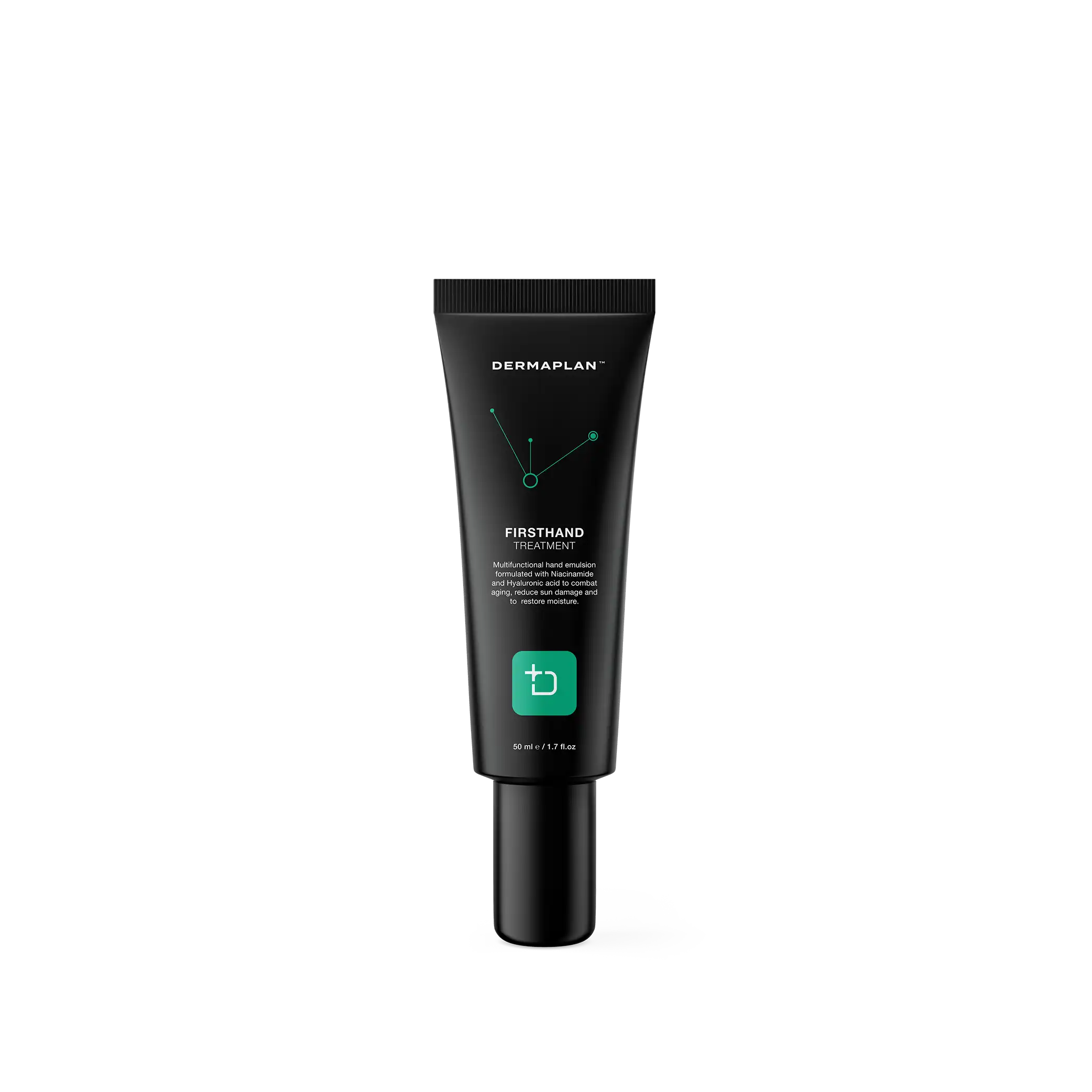





SIZE: 50 mL

Dry skin

Rough texture

Inflammation

Eczema

Ichthyosis
Rejuvenize, brighten and soothe dehydrated hands.
Firsthand™ stands as an advanced Physiological Ceramide-Dominant Barrier-Repair Therapy, constructed with a robust spectrum of moisturizing agents, constituting an intelligent moisturizing complex. The potency of this hand emulsion is amplified by its multifunctional formulation designed to promote collagen synthesis, attenuate the impact of solar damage, inhibit the reduction of skin elasticity, and mend a compromised skin barrier.
Key components such as Ceramides, Cholesterol, and Fatty acids work synergistically to reinforce the integrity of the skin's lipid barrier, bolstering its resilience against external insults. Incorporating Niacinamide invigorates cellular energy and ameliorates skin tone and texture, while d-panthenol, a potent vitamin B5 derivative, provides potent anti-inflammatory effects and aids in skin repair. Moreover, adding hyaluronic acid ensures optimum hydration by attracting and retaining moisture, which is vital for maintaining the skin's suppleness and health.
After utilizing Firsthand™, hands manifest signs of rejuvenation and radiance, while desiccation is thoroughly alleviated. The physiological enhancements rendered by Firsthand™ result in hands that appear and feel younger and stronger and exhibit enhanced health.
Emollients
Emollients are crucial in dermatological care, primarily because they enhance skin hydration and barrier function. Here's a brief overview of their physiological effects and roles in managing various skin conditions.
Physiological Effects
- Hydration of Stratum Corneum: Emollients increase moisture content in the stratum corneum, the outermost layer of the skin, by reducing transepidermal water loss (TEWL). This is achieved through occlusion, which traps water in the skin.
- Restoration of Skin Barrier Function: They aid in replenishing the skin's lipid barrier, which is essential for maintaining skin integrity and protective function.
- Soothing and Smoothing Effects: Emollients smooth, flaky skin cells, making the skin surface appear smoother. They also provide a soothing effect, which can reduce itching and discomfort.
- Anti-inflammatory Properties: Some emollients have ingredients that offer mild anti-inflammatory benefits, helping to reduce redness and irritation.
Managing Dermatological Conditions
- Atopic Dermatitis (Eczema): Emollients are a cornerstone in the management of eczema, helping to maintain skin hydration, reduce flare-ups, and minimize the need for topical corticosteroids.
- Psoriasis: Regular use of emollients can reduce scaling and dryness associated with psoriasis, improving the efficacy of other topical treatments.
- Ichthyosis and Xerosis: These conditions, characterized by dry, scaly skin, benefit significantly from emollients, which help hydrate and soften the skin.
- Aging Skin: Emollients improve the appearance of aging skin by hydrating and reducing the visibility of fine lines and wrinkles.
- Skin Protection: Emollients can protect the skin from irritation and breakdown in individuals with incontinence or those who are bedridden.
References
- Proksch, E., & Lachapelle, J. M. (2005). The Management of Dry Skin with Topical Emollients. American Journal of Clinical Dermatology.
- Lynde, C. W. (2001). Moisturizers: What They Are and a Practical Approach to Product Selection. Skin Therapy Letter.
- Lodén, M. (2003). Role of Topical Emollients and Moisturizers in the Treatment of Dry Skin Barrier Disorders. American Journal of Clinical Dermatology.
d-Panthenol
d-Panthenol's multifaceted effects on skin hydration, barrier strengthening, and wound healing make it a valuable component in the management of various dermatological conditions, from dry skin to post-procedure care.
d-Panthenol, also known as pro-vitamin B5, is a popular dermatological ingredient due to its beneficial effects on the skin. Here's a brief overview of its physiological effects and roles in managing various skin conditions:
Physiological Effects
- Hydration: d-Panthenol is a humectant, meaning it helps to attract and retain moisture in the skin. This leads to increased skin hydration, which can improve skin softness and elasticity.
- Wound Healing and Repair: It plays a role in the synthesis of lipids and proteins, essential for skin repair. d-Panthenol has been shown to accelerate re-epithelialization in wound healing.
- Anti-Inflammatory Effect: d-Panthenol can reduce inflammation, making it beneficial in treating skin irritations and erythema.
- Skin Barrier Strengthening: By enhancing the synthesis of lipids and proteins, d-Panthenol contributes to the strengthening of the skin's barrier function, protecting against irritants and environmental damage.
- Soothing and Softening: It soothes the skin and makes it feel softer and smoother, which can be particularly beneficial for dry or rough skin textures.
Managing Dermatological Conditions
- Minor Wounds and Skin Irritations: Due to its role in skin repair and anti-inflammatory properties, d-Panthenol is used in the treatment of minor wounds, cuts, and skin irritations.
- Dermatitis and Eczema: It helps in managing conditions like dermatitis and eczema by reducing inflammation and enhancing skin barrier function.
- Dry Skin Conditions (Xerosis): Its moisturizing properties make it effective in treating dry skin, providing relief from itching and scaling.
- Post-procedure Care: d-Panthenol is often used in post-procedure care, such as after laser treatments or chemical peels, to aid in skin recovery and reduce inflammation.
References
- Proksch, E., & Nissen, H. P. (2002). Dexpanthenol enhances skin barrier repair and reduces inflammation after sodium lauryl sulphate-induced irritation. Journal of Dermatological Treatment.
- Ebner, F., Heller, A., Rippke, F., & Tausch, I. (2002). Topical use of dexpanthenol in skin disorders. American Journal of Clinical Dermatology.
- Camargo, F. B. Jr, Gaspar, L. R., & Maia Campos, P. M. B. G. (2011). Skin moisturizing effects of panthenol-based formulations. Journal of Cosmetic Science.
Niacinamide
Niacinamide offers several benefits for the skin, primarily due to its anti-inflammatory and antioxidant properties. It reduces the redness and inflammation associated with acne, rosacea, and other inflammatory skin conditions. Additionally, niacinamide's ability to improve the skin's barrier function benefits all skin types, particularly those with eczema or mature skin.
Another significant benefit of niacinamide is its role in reducing hyperpigmentation. Studies have shown that it can decrease the transfer of melanin to the epidermis, helping to fade dark spots and even out skin tone.
Niacinamide also plays a role in reducing the visible signs of aging. It has been found to stimulate collagen production and improve skin elasticity, reducing fine lines and wrinkles. Its antioxidant properties further protect the skin from environmental damage, such as pollution and UV radiation, which contribute to premature aging.
The efficacy of niacinamide and its ability to address multiple skin concerns simultaneously has led to its growing popularity in both over-the-counter and prescription skincare formulations.
Physiological Effects
- Barrier Function Enhancement: Niacinamide helps strengthen the skin’s barrier function by increasing the production of ceramides, lipids that keep the skin hydrated and protect against environmental damage.
- Anti-inflammatory Properties: It has notable anti-inflammatory effects, which are beneficial in reducing redness and inflammation associated with acne, eczema, and other inflammatory skin conditions.
- Sebum Regulation: Niacinamide helps regulate sebum production, which controls excess oiliness and can benefit acne-prone skin.
- Hyperpigmentation Reduction: It reduces hyperpigmentation by inhibiting melanosome transfer from melanocytes to keratinocytes, leading to an even skin tone.
- Anti-aging Effects: Niacinamide helps reduce the appearance of fine lines and wrinkles by boosting collagen production and improving skin elasticity.
- Antioxidant Activity: It has antioxidant properties, protecting the skin from oxidative stress and environmental aggressors like UV radiation and pollution.
Managing Dermatological Conditions
- Acne and Oily Skin: Niacinamide effectively manages acne and oily skin by regulating sebum and reducing inflammation.
- Hyperpigmentation and Melasma: Its ability to reduce melanin transfer benefits it in treating hyperpigmentation and melasma.
- Aging Skin: Niacinamide targets wrinkles and loss of firmness.
- Skin Barrier Disorders: Niacinamide is beneficial in treating skin barrier disorders like atopic dermatitis and eczema by enhancing barrier function and hydration.
- Photodamage and Skin Protection: It helps mitigate the effects of photodamage and provides some degree of protection against environmental damage.
References
- Gehring, W. (2004). Nicotinic acid/niacinamide and the skin. Journal of Cosmetic Dermatology.
- Bissett, D. L., Oblong, J. E., & Berge, C. A. (2005). Niacinamide: A B vitamin that improves aging facial skin appearance. Dermatologic Surgery.
- Snaidr, V. A., Damian, D. L., & Halliday, G. M. (2019). Nicotinamide for photoprotection and skin cancer chemoprevention: A review of efficacy and safety. Experimental Dermatology.
- Navarrete-Solís, J. et al. (2011). A Double-Blind, Randomized Clinical Trial of Niacinamide 4% versus Hydroquinone 4% in the Treatment of Melasma. Dermatology Research and Practice, 2011.
Medilan™
Medilan™'s unique formulation and hypoallergenic properties make it a valuable component in managing various dermatological conditions, particularly for hydrating and soothing sensitive and dry skin.
Medilan™, an ultra-refined, hypoallergenic medical-grade lanolin, has proven to be very beneficial for managing dermatological conditions. Below is a brief overview of its physiological effects and roles in managing various skin conditions.
Physiological Effects
- Emollient: Medilan™ is an excellent emollient, helping to soften and smooth the skin by retaining moisture. It creates an occlusive barrier, which reduces transepidermal water loss (TEWL).
- Moisturizing: It is highly effective in moisturizing dry and rough skin, enhancing skin hydration by trapping and sealing in moisture.
- Hypoallergenic: Medilan™ is ultra-purified to minimize the risk of allergic reactions, making it suitable for sensitive skin types.
- Wound Healing: Medilan™ aids in the healing process of minor cuts, abrasions, and burns by maintaining a moist wound environment.
- Skin Barrier Function: It enhances the skin's barrier function, protecting against environmental irritants and reducing the risk of skin infections.
- Lipid Replenishment: Medilan™ mimics the lipids found in human skin, helping to restore the lipid barrier of the skin, especially beneficial in dry and chapped skin conditions.
- Skin Penetration and Hydration: It can penetrate the skin and aid in water retention in the stratum corneum, the outermost layer of the skin, thus enhancing hydration.
- Occlusive Properties: Medilan™ helps reduce transepidermal water loss by forming a barrier on the skin surface, thereby retaining moisture and improving skin barrier function.
Managing Dermatological Conditions
- Eczema and Dry Skin Conditions: Medilan™ is a valuable ingredient in treating eczema and other dry skin conditions due to its soothing, hydrating, and occlusive properties.
- Wound Healing: While primarily used for its emollient effects, the properties of Medilan™ also aid in healing minor wounds and skin irritations.
- Sensitive Skin Care: Its hypoallergenic nature makes it suitable for sensitive skin, reducing the risk of irritation or allergic reactions.
- Nipple Care in Breastfeeding: Soothes and heals cracked and sore nipples in breastfeeding mothers.
- Chapped Lips and Skin: It effectively treats chapped lips and skin, providing a barrier that seals in moisture and protects from harsh weather conditions.
References
- Lodén, M., & Maibach, H. I. (2000). Dry skin and moisturizers: chemistry and function. CRC Press.
- Suleman, H., et al. (2000). Role of lanolin in managing eczema and dry skin conditions. Community Nurse.
- DiNardo, J. C. (2000). Is lanolin allergy a myth? Dermatitis.
- Stone, L. (2000). Medilan: a hypoallergenic lanolin for emollient therapy. British Journal of Nursing.
- ResearchGate Article on Medilan™ highlighting its role in skin care and emollient therapy.
Ceramides
Ceramides, a family of lipid molecules naturally present in the skin, are integral to the structure and function of the skin barrier. They are a type of lipid that, along with cholesterol and fatty acids, forms a critical part of the stratum corneum, the outermost layer of the skin. This layer is essential for maintaining skin hydration and protecting against environmental aggressors.
Ceramides, which make up about 50% of the skin's lipid composition, play a pivotal role in maintaining the skin's barrier integrity and preventing transepidermal water loss (TEWL). By doing so, they help keep the skin hydrated and supple.
The loss or reduction of ceramides in the skin barrier is associated with several dermatological conditions, including eczema and psoriasis, where the skin becomes dry, itchy, and prone to irritation and infection. Studies have shown that the application of ceramide-containing moisturizers can effectively improve skin barrier function and increase skin hydration levels.
Ceramides are particularly beneficial for aging skin, which naturally loses ceramides over time, leading to drier and more fragile skin. By replenishing the skin's ceramide content, these products can help combat the signs of aging, such as fine lines and wrinkles.
Ceramides are integral to maintaining skin health, particularly in conditions where the skin barrier is compromised. Their role in hydrating the skin, reducing sensitivity, and improving barrier function makes them an essential component in the management of various dermatological conditions, especially eczema, psoriasis, and dry or aging skin.
Physiological Effects
- Barrier Function: Ceramides are critical components of the skin's lipid barrier. They help to prevent moisture loss and protect against environmental aggressors like pollutants and irritants.
- Hydration: By maintaining the barrier integrity, ceramides keep the skin hydrated, preventing dryness and keeping the skin supple.
- Reducing Skin Sensitivity: They play a role in reducing skin sensitivity and irritation, helping to calm inflamed and reactive skin.
- Anti-aging Properties: Ceramides can improve skin elasticity and firmness, helping to reduce the appearance of fine lines and wrinkles.
- Wound Healing: There is evidence to suggest that ceramides can aid in the skin's natural wound healing process.
Managing Dermatological Conditions
- Eczema and Atopic Dermatitis: Ceramides are often used in the treatment of eczema and atopic dermatitis, where the skin barrier is compromised, leading to dryness, itching, and inflammation.
- Psoriasis: They can help in managing psoriasis by maintaining skin hydration and barrier function, reducing scaling and dryness.
- Aging Skin: Ceramide-containing products are beneficial in anti-aging regimens due to their ability to improve skin barrier function and elasticity.
- Dry Skin (Xerosis): In the treatment of dry skin, ceramides help in restoring skin hydration and barrier function.
- Sensitive Skin: Products containing ceramides are suitable for sensitive skin as they help to restore the skin's natural barrier and reduce irritation.
References
- Del Rosso, J. Q., & Levin, J. (2011). The clinical relevance of maintaining the functional integrity of the stratum corneum in both healthy and disease-affected skin. Journal of Clinical and Aesthetic Dermatology.
- Farwanah, H., Wohlrab, J., Neubert, R. H. H., & Raith, K. (2005). Ceramides and skin function. American Journal of Clinical Dermatology.
- Di Nardo, A., Wertz, P., Giannetti, A., & Seidenari, S. (1998). Ceramide and cholesterol composition of the skin of patients with atopic dermatitis. Acta Dermato-Venereologica.









Unleash your creativity with the DermExcel Rose Gold Glitter Pen and Notepad set – where elegance meets functionality. The pen, adorned in stunning rose gold glitter, adds a touch of glamour to every stroke, while its smooth-flowing black ink ensures a flawless writing experience. Whether you're jotting down ideas, notes, or to-do lists, this pen makes every moment feel special.
Paired with a stylish notepad, this set is perfect for capturing your thoughts, plans, and inspirations on the go. It’s more than just a writing tool – it’s a statement of sophistication and flair. Ideal for your desk, bag, or as a thoughtful gift for someone special.
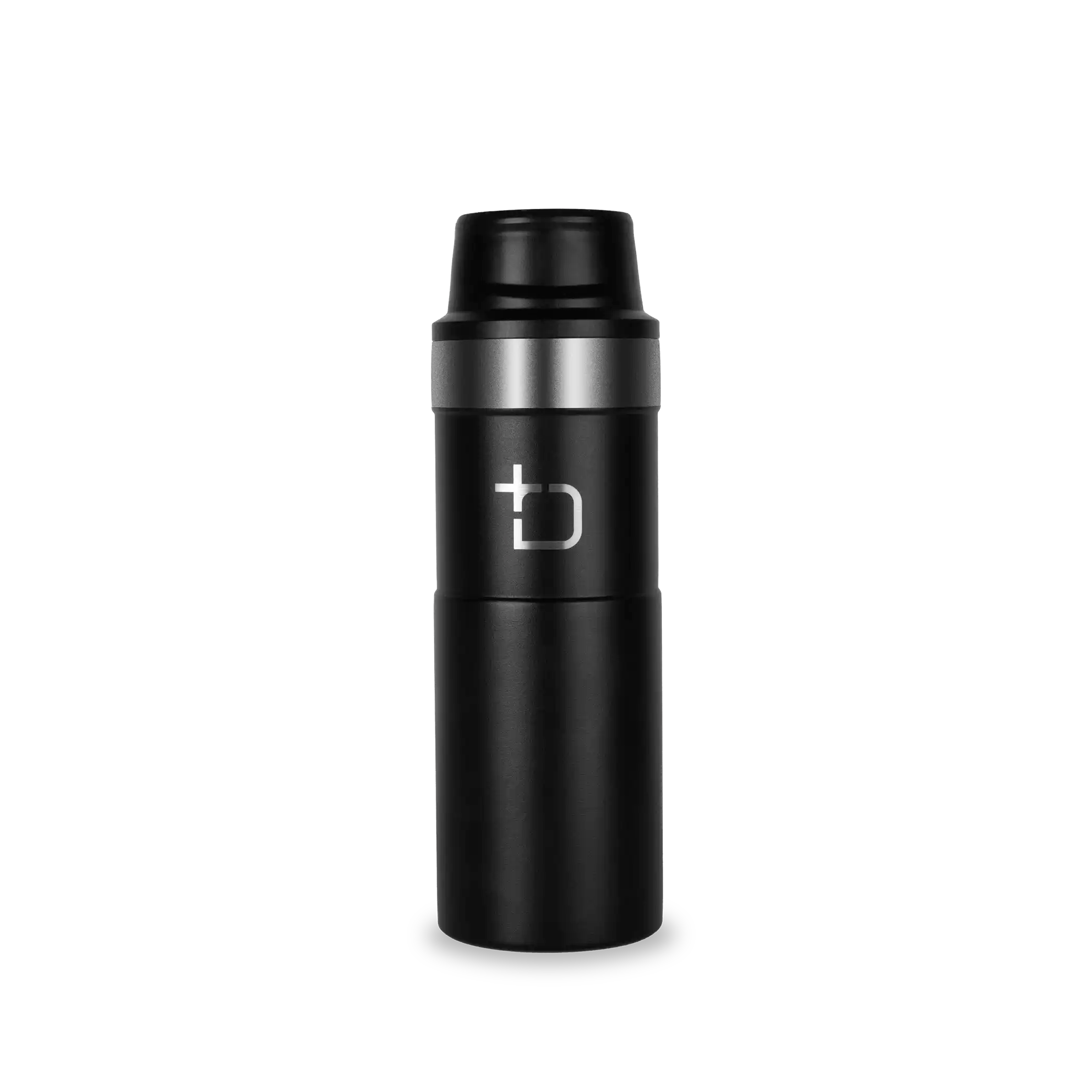
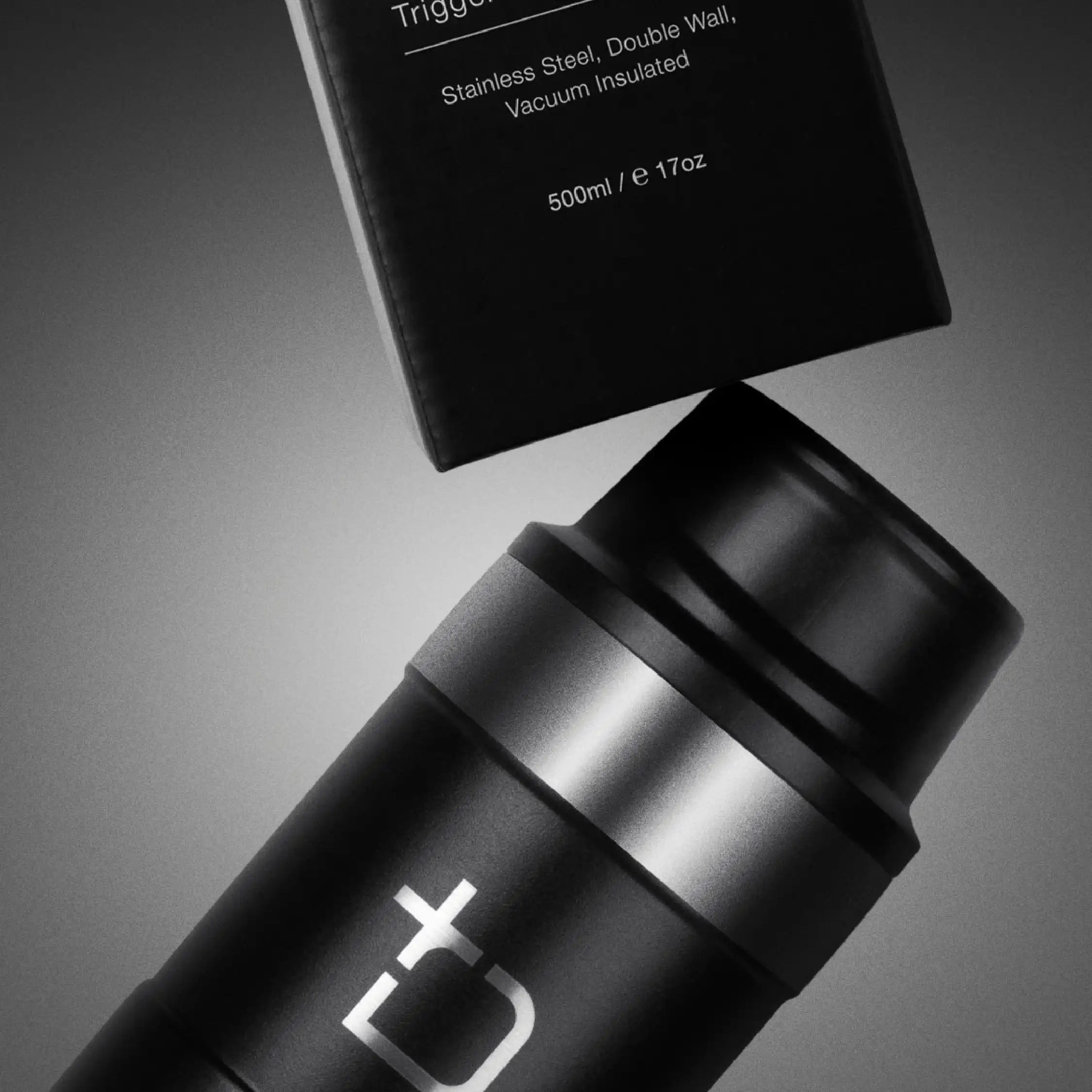
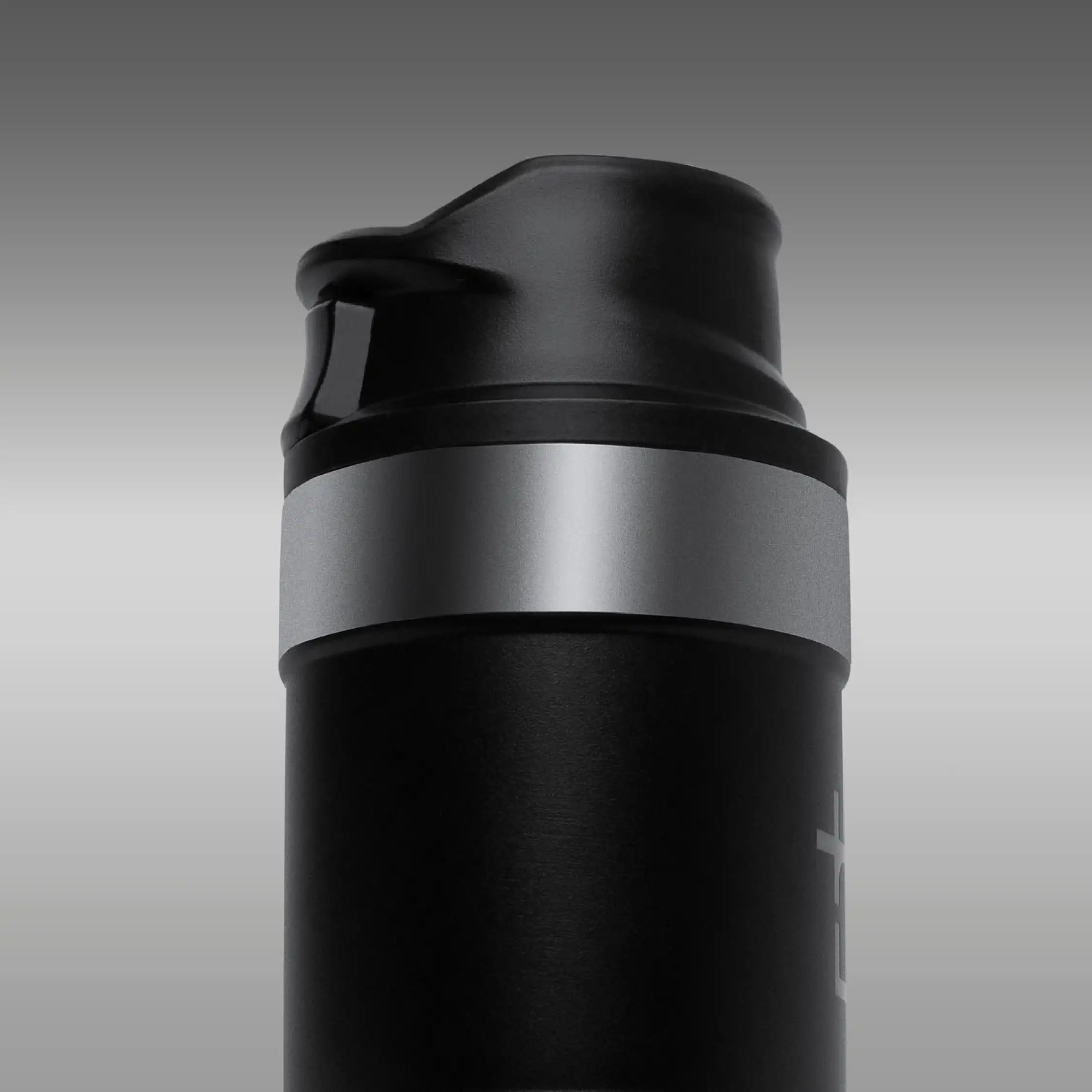





SIZE: 300 mL

stainless steel

leak-proof

Hot: 3 hrs

Cold: 4 hrs
Stay refreshed and energized wherever life takes you with the DermExcel Trigger Action Traveller. Expertly engineered for maximum performance, this premium travel companion seamlessly blends functionality, durability, and style.
Premium Stainless Steel Build: Crafted from high-quality 18/8 stainless steel, this bottle is built to last, resisting rust, corrosion, and wear to support your active lifestyle.
Double-Wall Vacuum Insulation: Advanced double-wall vacuum insulation keeps beverages hot, cold, or iced for extended periods, ensuring every sip is at the perfect temperature.
Leakproof Push-Button Lid: The innovative trigger-action lid allows for effortless one-handed operation, while the secure, leakproof design prevents spills, making it perfect for travel or daily use.
Optimal Capacity: With a 500ml capacity, it offers the ideal size for hydration or your favourite iced or hot beverage, without being bulky or cumbersome.
Stylish and Practical: Minimalist in design yet highly functional, the DermExcel Trigger Action Traveller seamlessly combines sleek aesthetics with everyday utility.
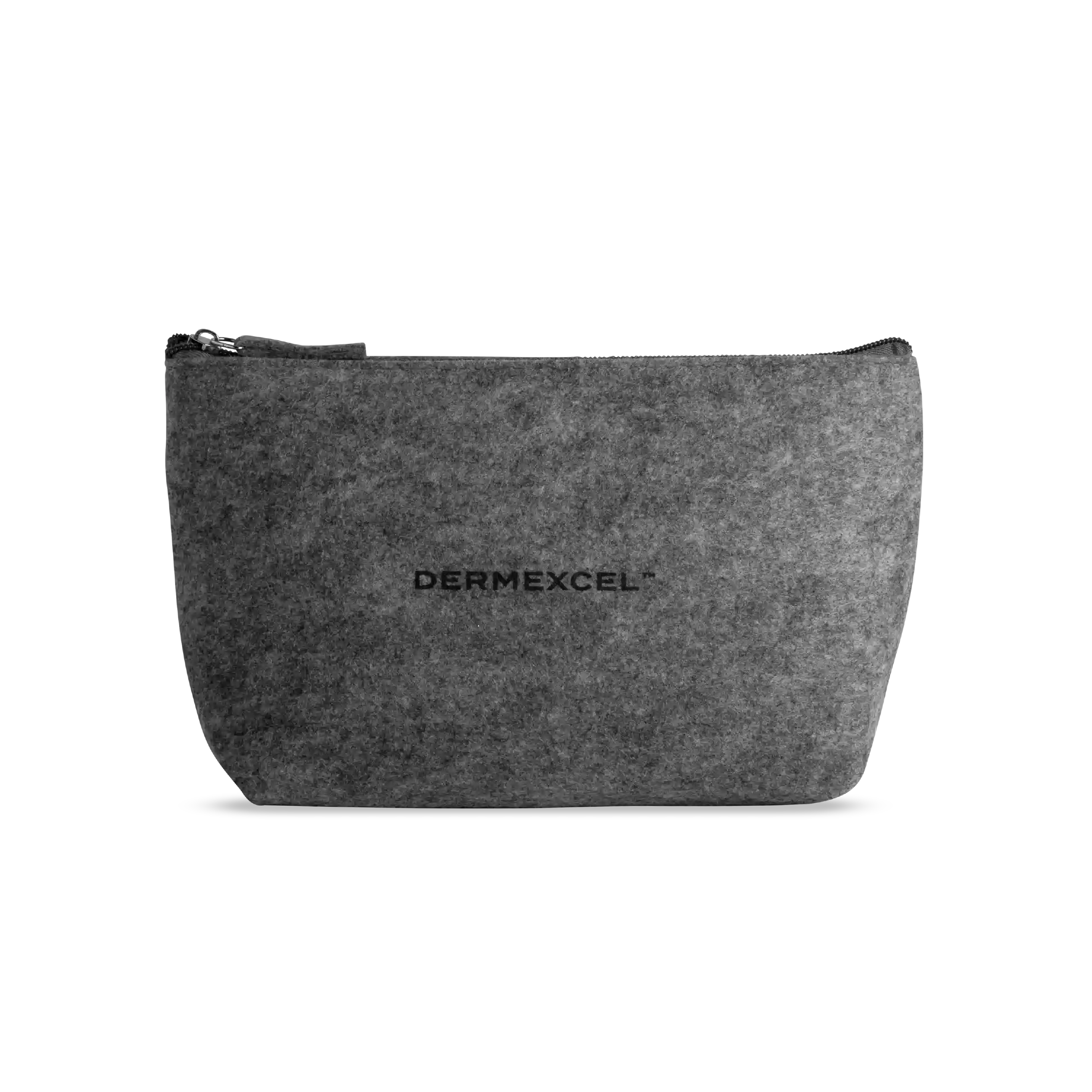
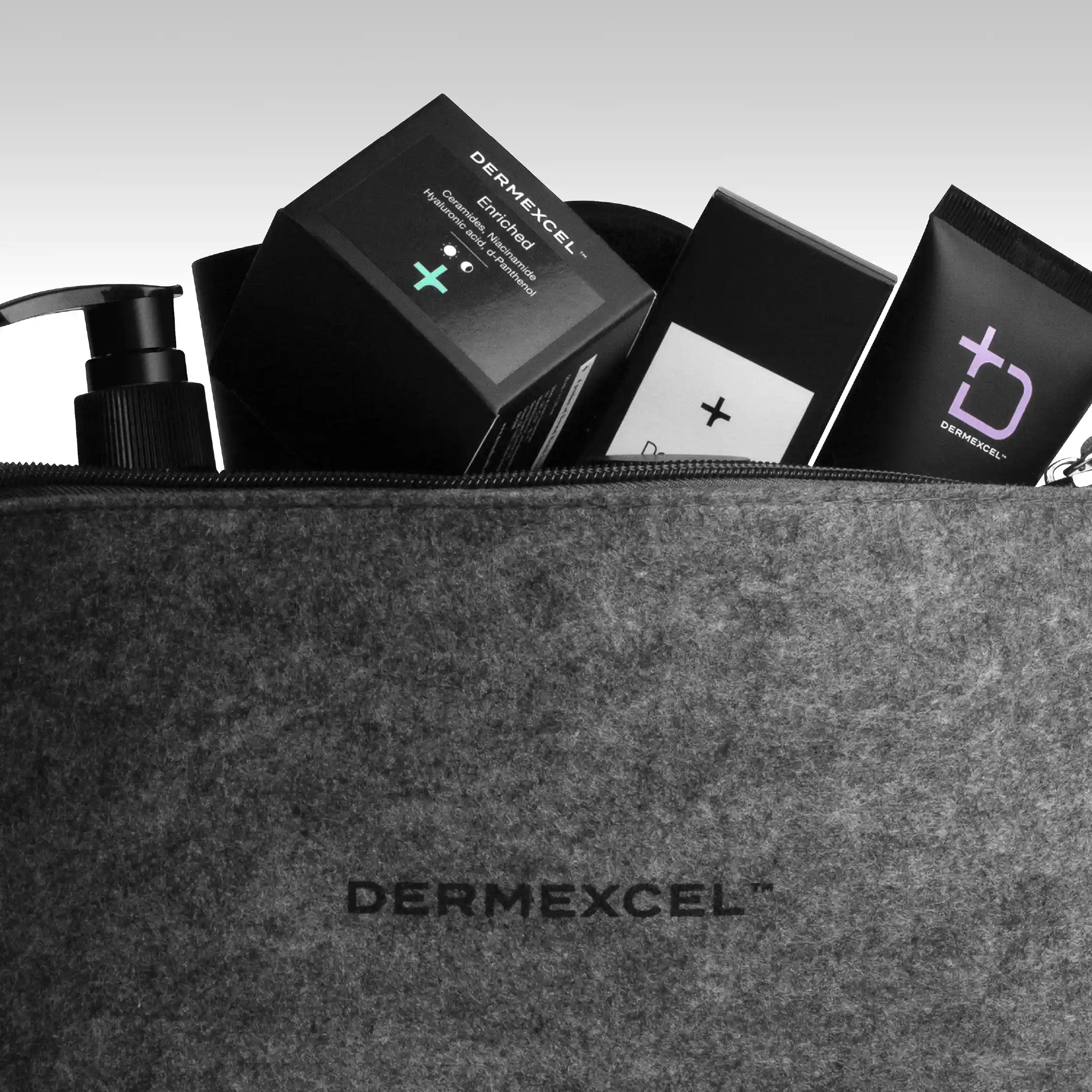




Crafted from durable RPET felt, this versatile accessory bag blends everyday utility with sustainable design. Made from recycled plastic bottles, it offers a responsible alternative to traditional materials—without compromising on style or strength.
Lightweight and structured, it’s ideal for storing skincare products, stationery, chargers, or small travel essentials. A sturdy zip closure and compact silhouette make it easy to slip into larger bags or carry on its own.
Whether you're organizing your desk drawer or packing for a weekend away, this felt pouch keeps your essentials neatly contained—and supports a cleaner planet with every use.
Features:
- Made from RPET felt (recycled plastic bottles)
- Steel zip closure for secure storage
- Lightweight, durable, and travel-friendly
Size: 27 cm (L) x 6 cm (W) x 15 cm (H)
Material: RPET Felt & Steel
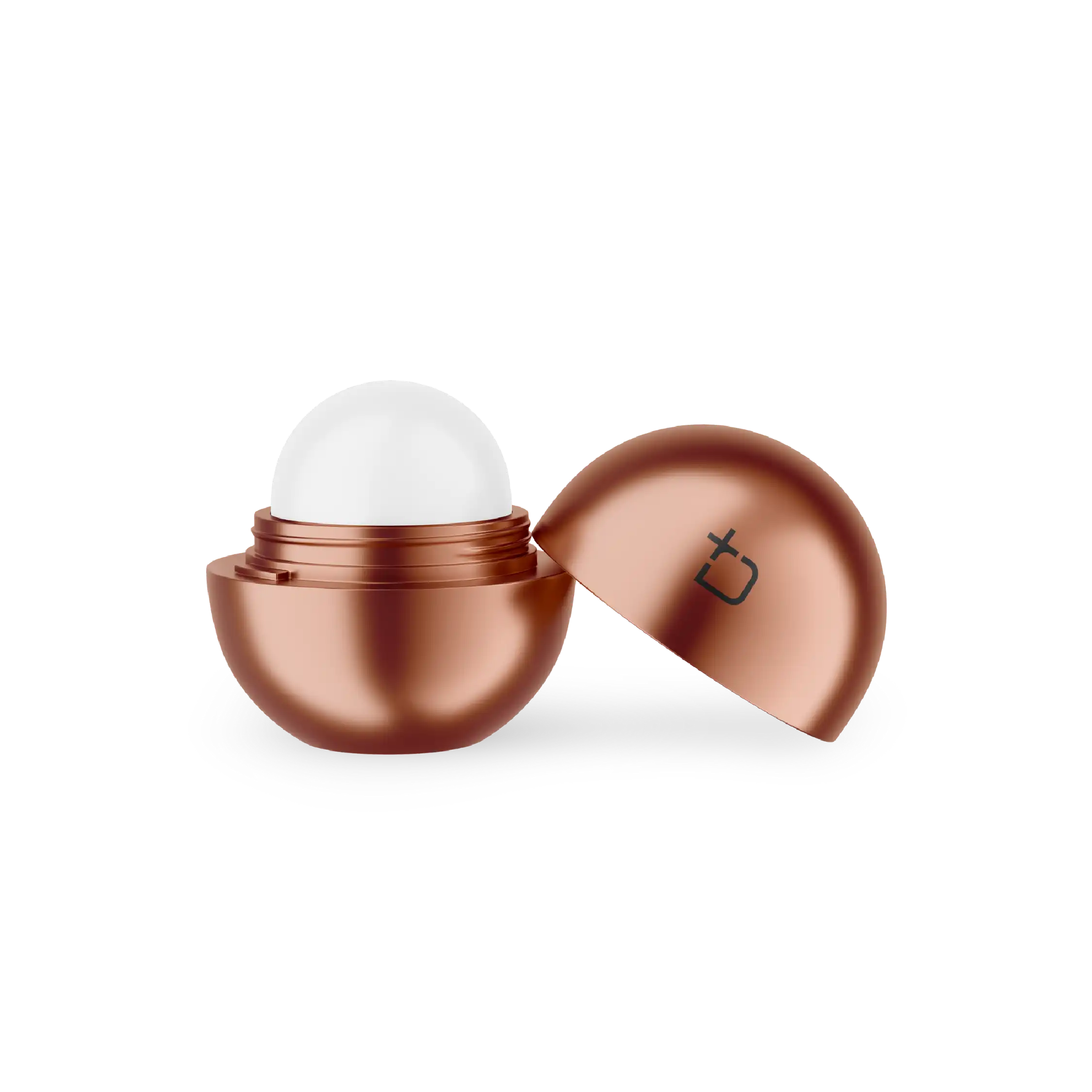

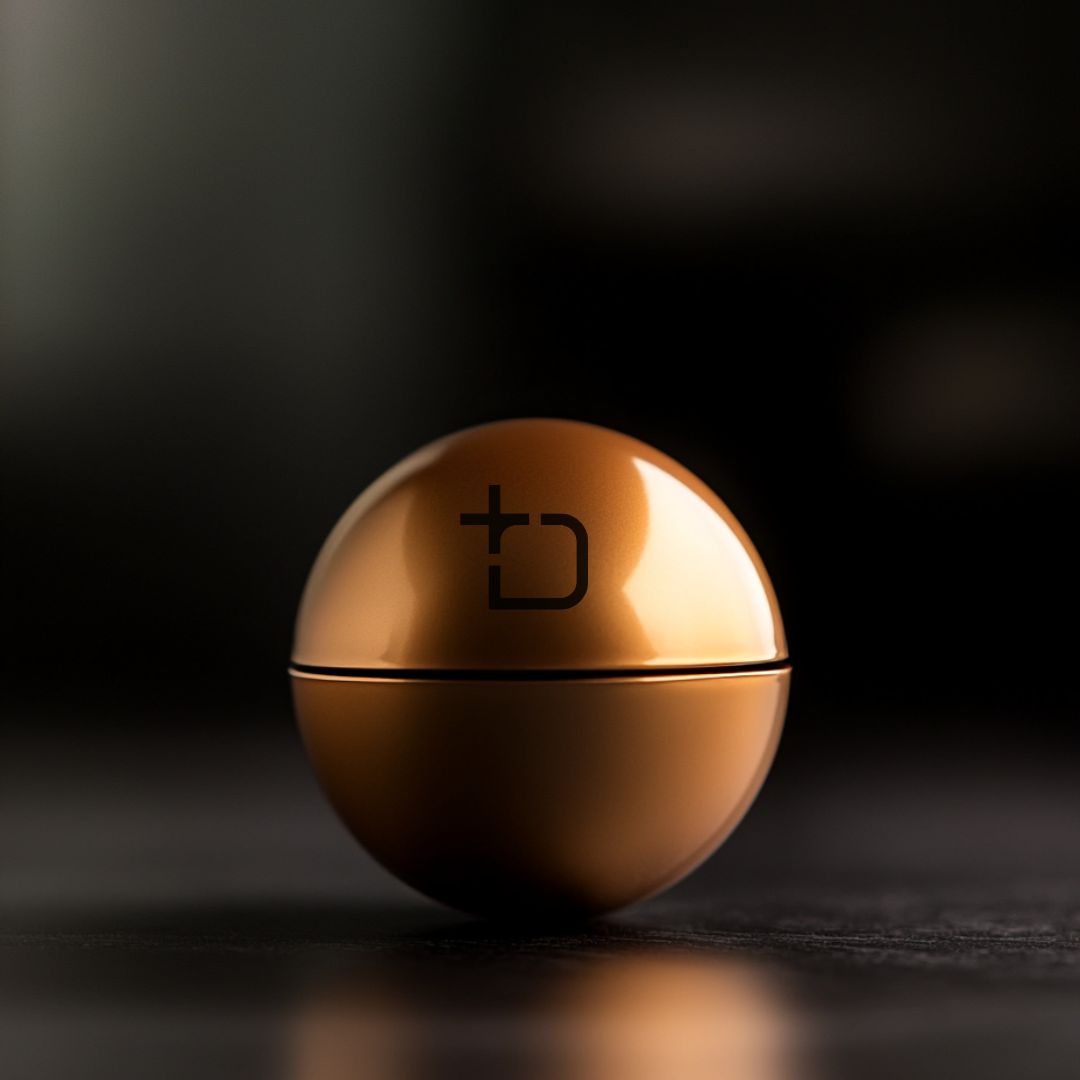






Primer

Softening

Protection

Healing

Moisturizing
DermExcel Lip Balm – your ultimate daily companion for smooth, nourished lips. Specially formulated with a blend of deeply hydrating natural oils and butters, this lip balm provides long-lasting moisture and protection against harsh environmental elements. Infused with antioxidant-rich vitamin E and soothing extracts, it repairs and rejuvenates dry, chapped lips, leaving them soft and supple. The lightweight, non-greasy formula absorbs quickly, offering an invisible shield of hydration with a subtle, refreshing scent. Whether you’re battling winter cold or summer sun, DermExcel Lip Balm keeps your lips perfectly moisturized, healthy, and kissably soft all day long.
DermExcel Lip Butter is a promotional item that Dermal Health Science does not manufacture.
Testimonials
This hand treatment is the best for dry hands work perfectly for your hands. Best product for your hands.
This was an excellent gift and I needed all the products put together in the gift.
I absolutely love these products, I’ve been using the range for 3 years now and will it change!!
Love it!
Wooow I am glowing I love 💖 it.
Thank you Dermal
Just the perfect gift for any mom or even yourself! Has just the right selection of products.














